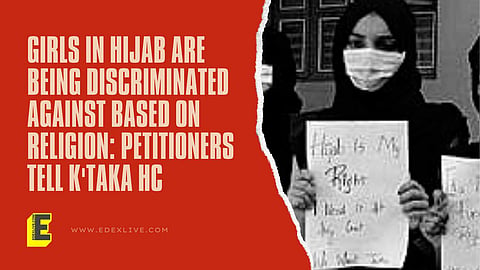#HijabRow: Muslim girls are least represented in schools; will be shut out entirely if hijab is banned
The Karnataka High Court has been asked if Muslim girls wearing a hijab, who are being refused entry into educational institutions, are being discriminated against simply because of their religion. Senior Advocate Ravivarma Kumar asked the three-judge Bench led by Chief Justice Ritu Raj Awasthi, Justice Dixit and Justice Khazi, why Muslim girls are being singled out despite the fact that most religions in India require followers to wear symbols on them.
"It is only because of her religion that the petitioner is being sent out of her classroom. A girl wearing a bindi is not sent out, nor is a girl wearing a bangle. Christians also wear crucifixes, and they are not stopped either. So why only these girls?" demanded Adv Kumar, adding that it was a violation of Article 15, which prohibits discrimination based on religion.
The Karnataka High Court's hearing of petitions filed against the ban on hijab in classrooms has yet again been adjourned for another day. Kumar also echoed Advocate Devadatt Kamat's points of plurality in the classroom from yesterday and said that it should be a platform for heterogeneity and not uniformity. He presented the case of Rosamma AV vs The University Of Calicut, and said that the court had in that matter decided that the heterogeneity was a motto of the Right to Education. To support his point, Kumar stated that Muslim girls were the least represented group of people in classrooms and are the least educated, and if they are shut out on grounds of the hijab, it will spell doomsday for their future. Further, Kumar asked why if a Sikh man wearing a turban can be allowed in the army, can't Muslim girls in hijab be allowed to sit in a classroom.
Kumar submitted the guidelines issued by the Pre-University Education Department of the state for the academic year 2021-22, which said that no uniform had been prescribed for the students. Additionally, there was no prohibition in wearing the hijab. However, Justice Dixit pointed out that the question to be asked by Kumar is not whether there is no prohibition, because in that case, it will be enquired whether there is no prohibition against carrying firearms.
When Kumar called out the "hostile discrimination" by the government towards Muslim girls in hijab, Justice Dixit asked if a non-Muslim girl suffering from alopecia, who wears a headdress to "cover her ugliness" would also be prohibited. The advocate replied that that analogy is inapplicable because the girl would be able to ask for an exemption.
Kumar also raised concerns over the College Development Committees which were cited in the GO, and were given authority over deciding the uniform. The advocate said that body was not statutory, and comprised of MLAs, which posed a serious threat to the separation of powers granted in the constitution, and put the fate of the students in the hands of political parties and ideologies.
The only other advocate to present his submissions today was Senior Advocate Yusuf Muchhala, who disputed the GO on grounds that it was "manifestly arbitrary" since these students had been wearing a headscarf for almost two years now. The Chief Justice questioned if the headgear was a part of the uniform to begin with, to which the advocate argued that the authorities cannot be so stringent in imposing the uniform. "If a girl wears glasses, can it be argued that it was not a part of the uniform? Why are Muslim girls who conscientiously believe that they should wear headscarves be put to a Hobson's choice regarding education and faith? Is it fair?" asked Muchhala.
The court will continue hearing the matter tomorrow, on February 17, at 2:30 pm. Yesterday, the court had refused to admit an affidavit that claimed that educational institutions were misusing the interim order issued by the High Court, which restricted students of educational institutions that prescribe uniforms from wearing additional items of religious clothing including hijabs and saffron shawls. Videos on social media show that authorities are demanding Muslim teachers remove their hijabs and burkhas on the street before entering the educational institutions. The petitioners had claimed that this was being done in an attempt to humiliate the community.


